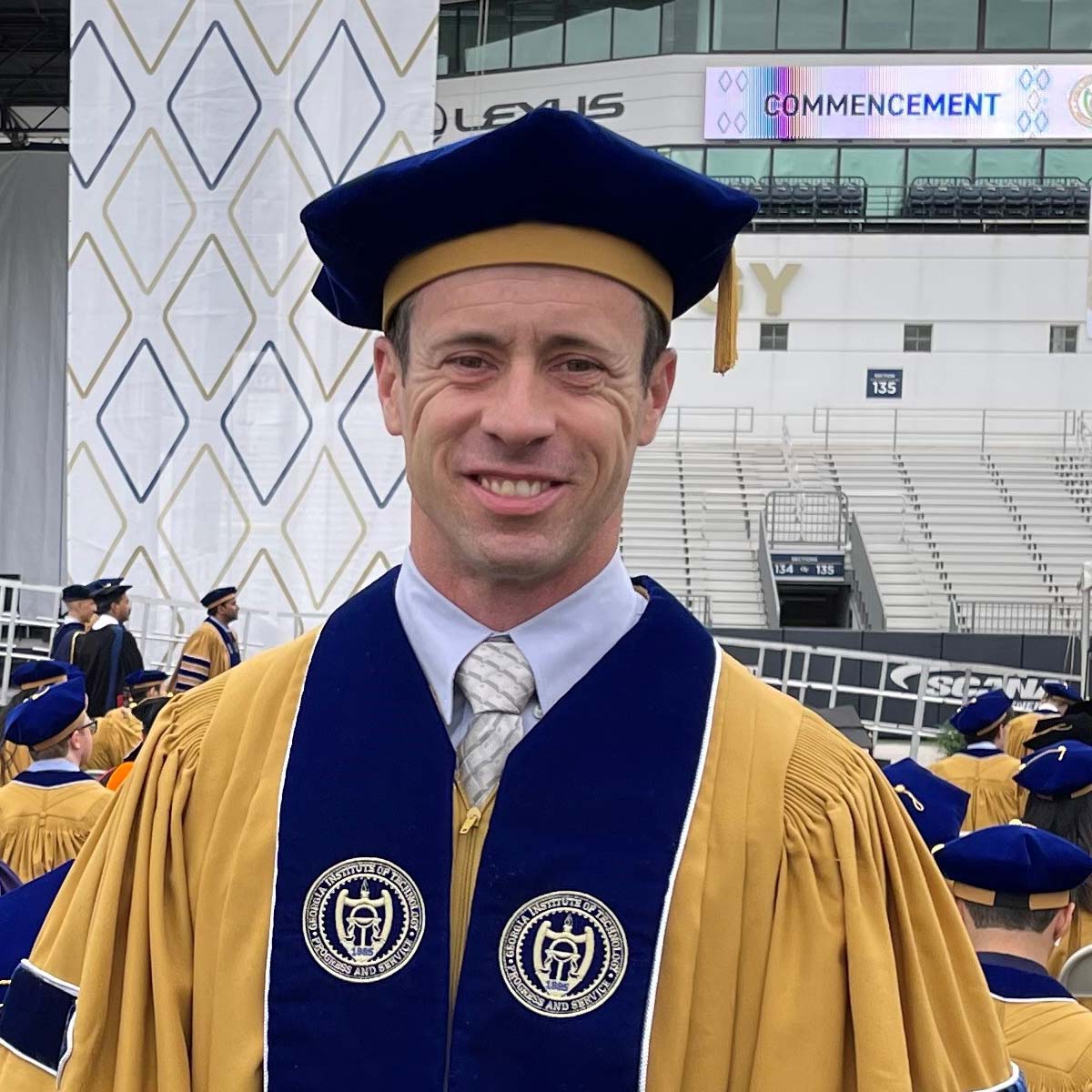As a soldier in the U.S. Army, one of the most important things learned in Basic Combat Training (BCT) are the Seven Core Army Values: loyalty, duty, respect, selfless service, honor, integrity, and personal courage. These values remain with soldiers throughout their career and often into civilian life.
Chris Green, a lieutenant colonel in the U.S. Army who earned his Ph.D. in Operations Management from the Georgia Scheller College of Business this spring, clearly lives these values. We recently sat down with him to learn more about his background, experiences in the military and at Scheller, and plans for the future, as we salute him and other military community members this Memorial Day.
Where are you from?
I grew up in Fayetteville, New York, just outside of Syracuse.
Your background is in the military, specifically the Army. What made you decide to join?
My father served for 22 years in the New York Army National Guard, so I was exposed to the Army very early on. I visited West Point as a young 10-year-old and knew that was where I wanted to attend college. I admired the tradition and prestige of the Academy and thought it would be the best place to develop my academic and leadership skills.
Why did you decide to pursue your advanced degrees while in the Army?
The Army afforded me the opportunity to return to West Point as an instructor in the Department of Systems Engineering. This was a great opportunity for me to better myself and to educate and mentor the next generation of young leaders for the Army. I was subsequently selected to return as senior faculty (after my Ph.D. studies) to further contribute to the mission of the Academy.
Why did you decide to obtain your Ph.D. in Operations Management?
My previous education focused on operations management (O.M.), and the courses I taught while on the faculty at West Point were O.M.-focused (introduction to operations management, decision analysis, supply chain, and information engineering). A Ph.D. in Operations Management seemed like a natural evolution of my education tract.
You were in the Army while you pursued each of your degrees. What is your secret for balancing your home and work life while pursuing these degrees?
There isn’t a secret. Really it is just rigid time management. I was diligent about scheduling when I would be home and at school and when I would be working and not. I treated school as my job (because it was) but made sure not to marginalize spending time with my family as my kids are young, and this is a unique chance I get to spend time with them.
Are you still planning to return to West Point as a member of the senior faculty in the Department of Systems Engineering?
I was originally slated to return to West Point in the summer of 2021 to resume a position as a member of the senior faculty. However, I was selected for a battalion command at the 5th Ranger Training Battalion (RTB) in Dahlonega, Georgia, so that assignment was delayed. I have subsequently been selected for a second battalion command at the 5th Security Forces Assistance Brigade (SFAB), so my assignment has been delayed again. I am currently slated to return to West Point in the summer of 2025.
Note: Both battalions consist of 200+ people. 5th RTB trains students for the U.S. Army Ranger School. 5th SFAB trains and advises foreign militaries in the Asia-Pacific region of the world.
Why did you choose Scheller?
Quite simply, Scheller felt like home. Throughout the application process and during my official visit, the faculty were extremely welcoming. Although I knew that I would be a student, they were open and conversant, which made me feel like they were invested in my success and I wouldn’t simply be going through the Ph.D. journey on my own.
What advice would you give someone considering pursuing a Ph.D.?
Pursuing a Ph.D. is different than any other level of education. Although courses are graded, understanding and internalizing the material is far more important than a course grade. When it comes to research, find a problem you are passionate about. I initially came to Scheller to study supply chain risk. Still, I ended up doing my research in performance management because I found several applications to the Army which we used as motivation.
Who would you like to thank for your success?
First and foremost, I’d like to thank my advisor, Dr. Morvarid Rahmani. Without her patience and guidance, I never would have been able to finish my degree. I’d also like to thank the entire faculty from the Operations Management area as they were instrumental in my success, especially my committee Dr. Karthik Ramachandran, Dr. Manpreet Hora, and Dr. Andre Calmon (and Dr. Steve Yoo from UCL). I’d also like to thank my fellow Ph.D. students, without whom I wouldn’t have gotten through coursework - Li Ding (my officemate), Zeya Wang, Swanand Kulkarni, and Abhinav Shubham. I had a great experience with everyone I met at Scheller.
We are approaching Memorial Day. What does this day mean to you, and do you have any specific ways you commemorate it?
Memorial Day is a sacred time for me. Usually, we always go to a parade, and I try to spend some time remembering all the fallen service members that have gone before us. I especially reflect on those heroes I have known who are no longer with us.
